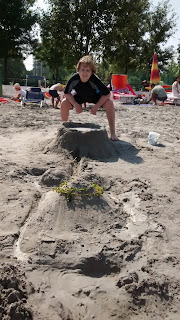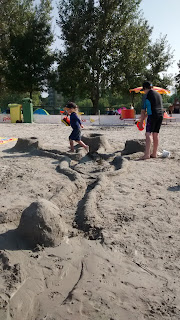 After two weeks of crisp and chilly mornings with clear and chilly afternoons, we are experiencing a (presumably brief) respite of beautiful golden warmth. What a blissful feeling! I just love the extravagance of warm afternoons after a period of cold. It feels so self-indulgent! And in October, the warmth is enhanced by the creeping gold and red color of the changing leaves. Is there anything more golden than a warm, October afternoon when the leaves are turning?
After two weeks of crisp and chilly mornings with clear and chilly afternoons, we are experiencing a (presumably brief) respite of beautiful golden warmth. What a blissful feeling! I just love the extravagance of warm afternoons after a period of cold. It feels so self-indulgent! And in October, the warmth is enhanced by the creeping gold and red color of the changing leaves. Is there anything more golden than a warm, October afternoon when the leaves are turning? Sunday the weather was so warm that I took Ronan to a sandy beach on the far side of the Tisza (from us, anyway.) I've had my eye on it all summer, but hadn't managed to figure out how to get down to it. We biked down and enjoyed a few hours playing in the sand. It was almost too warm! Not something I expected to feel a week into October. Ronan dubbed it "the beach with the sparkly sand" -- there's a lot of mica mixed in with the sand, so this is a good name for it. Now he wants to go back every day! I said we might have time some days, but not every day. It gets dark pretty early, after all.
Sunday the weather was so warm that I took Ronan to a sandy beach on the far side of the Tisza (from us, anyway.) I've had my eye on it all summer, but hadn't managed to figure out how to get down to it. We biked down and enjoyed a few hours playing in the sand. It was almost too warm! Not something I expected to feel a week into October. Ronan dubbed it "the beach with the sparkly sand" -- there's a lot of mica mixed in with the sand, so this is a good name for it. Now he wants to go back every day! I said we might have time some days, but not every day. It gets dark pretty early, after all.We were playing a bit before Sunday, too. Friday and Saturday we were at a Fulbright outing - we visited Veszprém, Zirc, Bakonbél, and Pápa. These are all west of Budapest, and a bit north of Lake Balaton - up into the Bakony mountains. (These are more like East Coast mountains, so I'm schooling myself not to call them hills.) Although our entry into Veszprém was less than ideal, since it was accompanied by Ronan's first experience with motion-sickness, we avoided similar drama the rest of the trip. (Thank goodness!)

Veszprém is a beautiful city, and I wouldn't mind the chance to go back and wander around. While there we visited the University of Pannonia -- the English and American studies programs. Interesting fact: I almost applied to the Fulbright position at the University of Pannonia. They have a really strong chemical engineering program. But then I met my current host at an American Chemical Society (ACS) conference, and it was too good a connection to look elsewhere. But hey -- now I do have a contact at the University of Pannonia, so...maybe in future...
We also visited Veszprém's American Corner. They have a weekly science activity for kids, so of course I was interested. They have a library of English-language books, and Tristan discovered "The Hitchhiker's Guide to the Galaxy." He wanted to borrow it, but of course we don't live in Veszprém. I had to assure him a bunch of times that we could get it from our own library, probably in e-book form, and probably as soon as we next had internet access. He was hard to convince. He wanted to stay. So did Ronan, who had discovered the toys in the kids corner. He was having so much fun playing that he cried when we had to leave, poor bug. Of course he was also quite hungry by then, since I still wasn't sure what his stomach was up to -- so that didn't help.
Veszprém is also home to World's End. It might not be quite as dramatic as the Cliffs of Moher, but still quite beautiful and unexpected, given the local terrain. Nearby World's End is a church with an arm-bone from Blessed Erzsébet, the beloved wife of Hungary's first Christian king, Saint Istvan. I'm not much into relics of this kind, but it certainly was interesting to see. I wonder if it was her lower arm or upper arm -- I'm not very well-versed in human anatomy, I'm afraid.
Zirc is a short drive from Veszprém north, into the mountains. It's home to a beautiful Cistercian abbey. We admired the gorgeous books in their library. Well, most people did. I followed Ronan around, trying to convince him that there was something to be interested in. I finally hit on trying to find the biggest, "stumpiest" book in each of the library rooms. (In case you haven't yet encountered this word, "stumpy" is usually used (by Ronan, and now by us, too) to describe size, or quantity, but not exclusively. It can express other characteristics, too. Ronan once described a harbor seal as a "bundle of stump." So you see it is a flexible word. It always said admiringly, though -- regardless of what other characteristics are being described.) There were some pretty stumpy books, I can tell you! And of course it was a library, so there was a stump of books there.
 The Cistercian's didn't just collect books; they also collected trees. There's a beautiful arboretum just outside the abbey walls. We took a lovely walk there. It was such a mild afternoon, and the air was so fresh in the mountains, it was quite a treat. Ronan and I rambled along, threw pine cones into the creek, and looked at mushrooms. Tristan hung out with a couple of his adopted uncles - in Hungarian these are bácsi (plural would be bácsik.) (Incidentally, this is also how students address their teachers -- female teachers are "aunts" and male teachers are "uncles.") Tristan has several "uncles" among the Fulbrighters, which is fabulous. I really appreciate how welcoming everyone has been with him, especially. He needs more people.
The Cistercian's didn't just collect books; they also collected trees. There's a beautiful arboretum just outside the abbey walls. We took a lovely walk there. It was such a mild afternoon, and the air was so fresh in the mountains, it was quite a treat. Ronan and I rambled along, threw pine cones into the creek, and looked at mushrooms. Tristan hung out with a couple of his adopted uncles - in Hungarian these are bácsi (plural would be bácsik.) (Incidentally, this is also how students address their teachers -- female teachers are "aunts" and male teachers are "uncles.") Tristan has several "uncles" among the Fulbrighters, which is fabulous. I really appreciate how welcoming everyone has been with him, especially. He needs more people. This brings me to the other reason why this trip was so welcome. Yes, of course it was extremely fun to be guided through beautiful places, and learn about interesting history and culture. But more than that, it was really helpful to reconnect with friends in a social, casual setting. We don't get enough of that in Szeged. I've been working on changing that mix for us by inviting people over, but that only goes so far.
This brings me to the other reason why this trip was so welcome. Yes, of course it was extremely fun to be guided through beautiful places, and learn about interesting history and culture. But more than that, it was really helpful to reconnect with friends in a social, casual setting. We don't get enough of that in Szeged. I've been working on changing that mix for us by inviting people over, but that only goes so far.Ronan is probably the best off of the three of us - he gets to play with friends all day. Tristan has a little time to talk at school, of course, but so far he hasn't been able to get together with friends outside of school. Many of his classmates are extremely busy with extra-curricular activities. We're working on it, but it's challenging. So it was especially welcome because Tristan got to spend most of the two days on the trip hanging out with his bácsik -- which was fabulous for everyone involved.
And me? I do OK most of the time. I'm used to having a lot more interactions with my colleagues, though. Here at SZTE my colleagues are uniformly very busy -- so I don't see them much, and I feel a little awkward approaching them to ask if they want to go out for lunch, or get a coffee. It feels like an imposition. So as I said earlier, I've compromised by hosting parties on the weekends. (Speaking of which -- I think it's time to host another one!)
Anyway, even though I've described a lot, that wasn't even the whole of Friday. After Zirc we headed to Bakonybél, a tiny little town deeper into the Bakony mountains -- that happens to have an observatory. So that evening after dinner we walked to the observatory, and got to have fun looking through a telescope. Improbably, the weather was even cooperative! It was a beautiful, clear night; a little humid, so some of the images weren't super clear, but still. No complaints. We got to see Saturn, Mars, a star cluster, and the Messier 57 (M57) ring nebula. Then we went down to the planetarium and saw a movie on black holes. Finally, everyone trouped out to the roof to do some good, old-fashioned star gazing. By this time Ronan was seriously tired (it was after 10pm), so we headed back to the hotel with a few other Fulbrighters who were ready to turn in, too. The night was crisp and dark, the walk was refreshing and companionable, and the beds were comfortable. Although it might've started a bit rough, it turned into a lovely day.




























